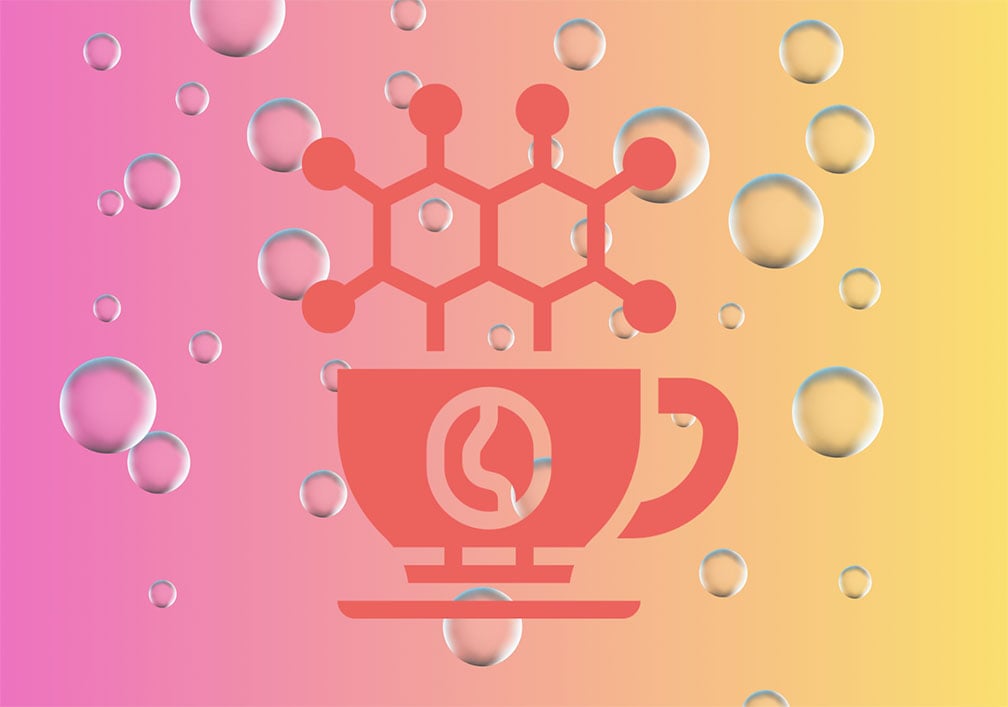Blog
Does Caffeine Dehydrate You? How to Stay Energized and Hydrated
While it’s commonly thought that caffeine, and the beverages that contain it, are dehydrating, there’s good news from science. Moderate coffee drinkers (3-6 cups a day) were studied for signs of dehydration. Researchers measured fluid levels and other markers of hydration and found no sign of dehydration among their subjects. The data suggests that moderate consumption of coffee hydrates similarly to water. This is good news if you like hydration and energy!
But why do so many people think that caffeine is dehydrating? Caffeinated beverages like coffee and tea may have a diuretic effect (increase in urination), and many health professionals recommend limiting caffeine and sugary drinks to stay hydrated.
In a review of caffeine and fluid balance, studies found that coffee/tea drinkers adjust to the mild diuretic effect of caffeine. The result is most pronounced in people who take a large amount of caffeine (250 mg-300 mg) after not having caffeine for days or weeks. The review concluded that no clear evidence exists that drinking caffeinated beverages regularly disrupts your fluid levels.
Should You Have Caffeine Every Day?
When it comes to anything, whether it’s caffeine, sugar, or vegetables, the only “should” is this: do what’s right for you now. If you like taking caffeine every day, go for it. There is a lot of research about the benefits of caffeine, everything from supporting exercise-induced asthma, reducing pain during a workout, and increasing alertness for people driving at night.
Can Caffeine Dehydrate You?
Caffeine has a much better impact on hydration than is commonly touted. Yes, caffeine can have a diuretic effect, but studies are finding that this primarily affects people who don’t take caffeine regularly when they take a large amount. In this same study, participants who regularly drank coffee didn’t experience any dehydration from caffeine. Studies show that coffee and tea “offered similar hydrating properties to water.”
But what about the studies, like this one, that show water loss from caffeine use? Many of these studies had participants who regularly took caffeine but abstained before the study. Even a few days off caffeine reduces caffeine tolerance, preventing a diuretic effect. Had the participants not abstained or been given a huge amount of caffeine (642mg, more than 6 cups of coffee), the results may have been drastically different. So, researchers caution against taking this study at face value, given this flaw.
All right, what are the takeaways? If you regularly use caffeine, you’re in the clear. Still, drink your water and take your electrolytes, but your caffeine gummy or espressos aren’t dehydrating you. But, if you are new to caffeine or haven’t used it for a while, you may experience a diuretic effect if you suddenly drink six strong cups of coffee.
3 Ways to Energize and Hydrate with Caffeine
1. Keep drinking your water.
Hydration issues occur not in the presence of caffeine and caffeinated beverages but in the absence of water. Suppose you’re drinking more sports drinks, coffee, tea, or energy drinks than plain water; that can lead to dehydration. Hate water? You aren’t alone! Many people dislike drinking plain water, and even those who don’t mind it often find water boring after the 6th cup.
Try adding lemon slices, mint leaves, or pieces of cucumber to your water to make it more interesting. Lemon and cucumber are also naturally hydrating and help your body absorb the water you’re drinking.
2. Take your electrolytes.
Humans need regular sources of electrolytes. Electrolytes are lost through urination and sweat. Even if you aren’t drinking caffeinated beverages or taking caffeine but are drinking plenty of water, that will increase your fluid loss through urination. Eating fresh fruits and vegetables provides electrolytes (lemonade counts!), and many people supplement their electrolytes with hydration gummies.
Hydration or electrolyte gummies are often more convenient for those who need electrolytes on the go, think athletes or busy parents. Hydration gummies are easy to take and offer concentrated doses of electrolytes when needed.
3. Use sugar correctly.
Carbohydrates, or sugar, can support hydration in the correct amounts. Yes, too many highly sweetened drinks won’t help you stay hydrated, but eliminating sugar isn’t helpful either. This is particularly true if you are working out; taking glucose or carbohydrates with your electrolytes is one of the best ways to replenish your muscle glycogen and support recovery.
Even if you aren’t working out, the sugar in a hydration gummy, or a single sports drink, can support hydration. As long as you drink enough, it can be helpful for hydration. And, if mildly sweetened lemon water helps you drink more water, that is very helpful. Honey is a natural superfood and is used in oral rehydration therapies.
Hydration Gummies for Energy from Seattle Gummy
One of the very first signs of dehydration is low energy, which first impacts your performance. Keep your body safe, healthy, and energized with the HydraFuel hydration gummy from Seattle Gummy! This delicious, heat-stable gummy addresses your performance concerns in two ways:
- With an optimal blend of bioavailable electrolytes that quickly absorb for fast, effective hydration, the HydraFuel gummy is for everyone in the family! From your weekend warrior to the kids running track to grandma taking walks, the HydraFuel gives them fast electrolytes when needed.
- When you’re working out or working at staying hydrated in the heat, it takes a lot of energy. With quick-acting glucose, the HydraFuel gives your body easy-to-use fuel to give your muscles energy….fast. Plus, some sugar, or glucose, is helpful for your hydration.
Take a HydraFuel during or after your next workout or sunbathing by the pool. Enjoy the gifts of good hydration, steady energy, a clear mind, and a healthy body. With its delicious citrus flavor and balanced blend of bioavailable electrolytes, the HydraFuel gummy works fast and effectively…with none of the nausea other hydration formulas sometimes cause.

